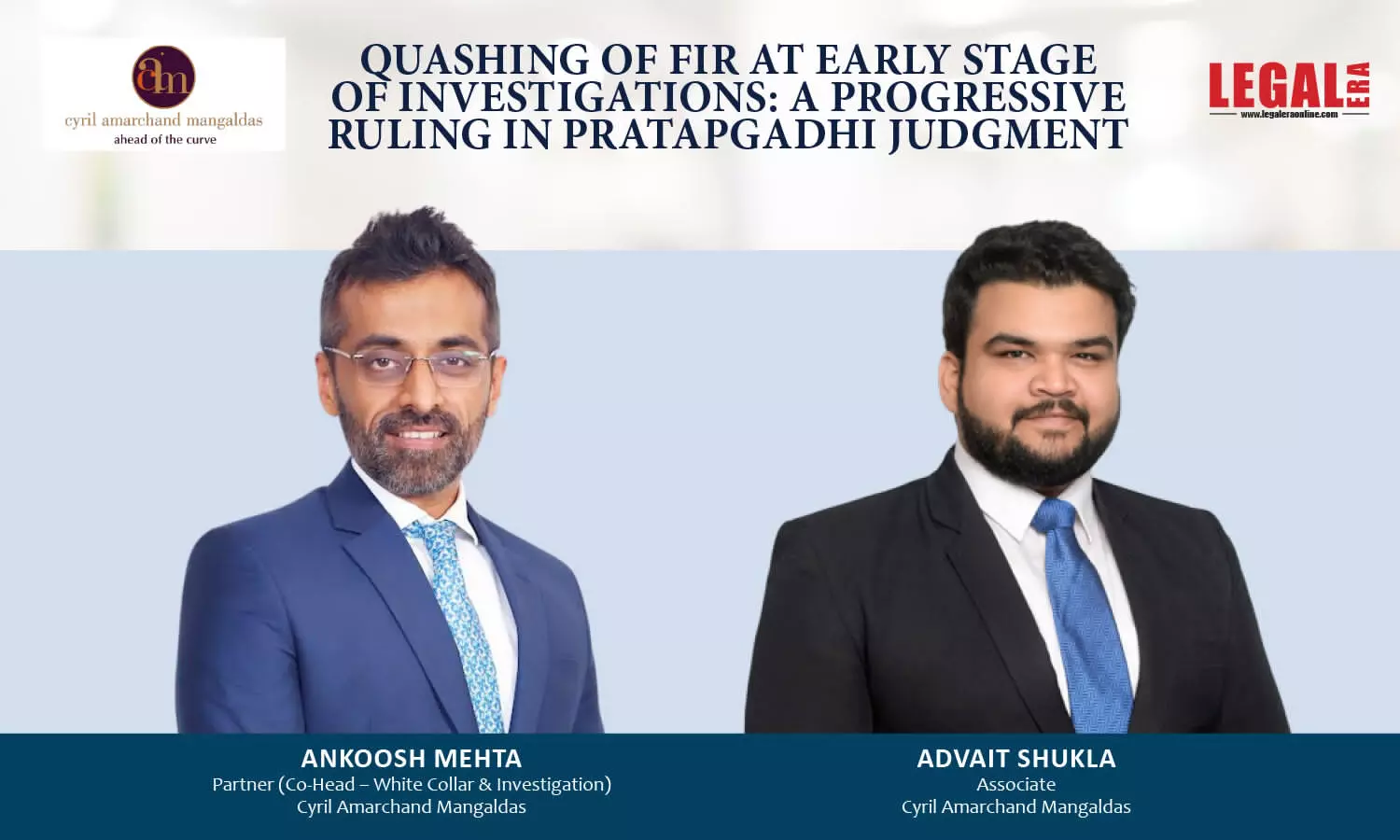- Home
- News
- Articles+
- Aerospace
- Artificial Intelligence
- Agriculture
- Alternate Dispute Resolution
- Arbitration & Mediation
- Banking and Finance
- Bankruptcy
- Book Review
- Bribery & Corruption
- Commercial Litigation
- Competition Law
- Conference Reports
- Consumer Products
- Contract
- Corporate Governance
- Corporate Law
- Covid-19
- Cryptocurrency
- Cybersecurity
- Data Protection
- Defence
- Digital Economy
- E-commerce
- Employment Law
- Energy and Natural Resources
- Entertainment and Sports Law
- Environmental Law
- Environmental, Social, and Governance
- Foreign Direct Investment
- Food and Beverage
- Gaming
- Health Care
- IBC Diaries
- In Focus
- Inclusion & Diversity
- Insurance Law
- Intellectual Property
- International Law
- IP & Tech Era
- Know the Law
- Labour Laws
- Law & Policy and Regulation
- Litigation
- Litigation Funding
- Manufacturing
- Mergers & Acquisitions
- NFTs
- Privacy
- Private Equity
- Project Finance
- Real Estate
- Risk and Compliance
- Student Corner
- Take On Board
- Tax
- Technology Media and Telecom
- Tributes
- Viewpoint
- Zoom In
- Law Firms
- In-House
- Rankings
- E-Magazine
- Legal Era TV
- Events
- Middle East
- Africa
- News
- Articles
- Aerospace
- Artificial Intelligence
- Agriculture
- Alternate Dispute Resolution
- Arbitration & Mediation
- Banking and Finance
- Bankruptcy
- Book Review
- Bribery & Corruption
- Commercial Litigation
- Competition Law
- Conference Reports
- Consumer Products
- Contract
- Corporate Governance
- Corporate Law
- Covid-19
- Cryptocurrency
- Cybersecurity
- Data Protection
- Defence
- Digital Economy
- E-commerce
- Employment Law
- Energy and Natural Resources
- Entertainment and Sports Law
- Environmental Law
- Environmental, Social, and Governance
- Foreign Direct Investment
- Food and Beverage
- Gaming
- Health Care
- IBC Diaries
- In Focus
- Inclusion & Diversity
- Insurance Law
- Intellectual Property
- International Law
- IP & Tech Era
- Know the Law
- Labour Laws
- Law & Policy and Regulation
- Litigation
- Litigation Funding
- Manufacturing
- Mergers & Acquisitions
- NFTs
- Privacy
- Private Equity
- Project Finance
- Real Estate
- Risk and Compliance
- Student Corner
- Take On Board
- Tax
- Technology Media and Telecom
- Tributes
- Viewpoint
- Zoom In
- Law Firms
- In-House
- Rankings
- E-Magazine
- Legal Era TV
- Events
- Middle East
- Africa

Quashing Of Fir At Early Stage Of Investigations: A Progressive Ruling In Pratapgadhi Judgment
Quashing Of Fir At Early Stage Of Investigations: A Progressive Ruling In Pratapgadhi Judgment

Quashing Of Fir At Early Stage Of Investigations: A Progressive Ruling In Pratapgadhi Judgment The Supreme Court of India, in the recent case of Imran Pratapgadhi vs. State of Gujarat affirmed the inherent powers of the High Court to quash a First Information Report (“FIR”) even at the preliminary or nascent stage of investigation Introduction In recent times, the misuse of initiation...
To Read the Full Story, Subscribe to Legal Era News
Access Exclusive Legal Era Stories, Editorial Insights, and Expert Opinion.
Already a subscriber? Sign in Now
Quashing Of Fir At Early Stage Of Investigations: A Progressive Ruling In Pratapgadhi Judgment
The Supreme Court of India, in the recent case of Imran Pratapgadhi vs. State of Gujarat affirmed the inherent powers of the High Court to quash a First Information Report (“FIR”) even at the preliminary or nascent stage of investigation
Introduction
In recent times, the misuse of initiation of criminal prosecution to settle personal scores has become rampant. The criminal process is often weaponized to harass and intimidate rivals, which leads to a rather disturbing trend wherein baseless and malicious prosecutions are initiated under the guise of legitimate criminal proceedings. Such misuse of powers not only damages the integrity of the law enforcement agencies but also dampens the public confidence in the criminal justice system. Under such circumstances, judicial intervention becomes necessary to thwart abuse of process.
Section 528 of the Bharatiya Nagrik Suraksha Sanhita, 2023 (“BNSS”) which is equivalent to Section 482 of the Criminal Procedure Code, 1973 (“CrPC”), preserves the inherent powers of the High Court, to pass necessary orders, to give effect to any order passed under the BNSS (or CrPC under Section 482 of CrPC) or to prevent the abuse of process of any court or otherwise to secure the ends of justice. These powers are exercised ex debito justitae, i.e., to do real and substantial justice, as it would be an abuse of process of the court to allow any action which would result in injustice and prevent administration of justice1. Simply put, the High Courts are empowered to intervene in cases of abuse of process of court or when it is necessary to secure the ends of justice.

This article discusses the law laid down by the Supreme Court of India in the recent case of Imran Pratapgadhi vs. State of Gujarat2 (“Pratapgadhi”), which affirmed the inherent powers of the High Court to quash a First Information Report (“FIR”) even at the preliminary or nascent stage of investigation. It also highlights judicial safeguards against misuse of criminal proceedings, and to protect individuals from prolonged criminal investigations and examines distinction between the CrPC and the BNSS, regarding preliminary inquiries.
Background
An FIR was registered against the accused for offences under the Bharatiya Nyay Sanhita, 2023 (“BNS”) inter alia involving promoting enmity and disrupting public tranquility. The accused moved the Gujarat High Court to quash the FIR, arguing that no offence was made out against him. The High Court dismissed the petition, observing3 that the investigations were still at a nascent stage and there was no reason to exercise powers under section 528 of BNSS or under Article 226 of the Constitution of India. Aggrieved by the decision, the accused filed an appeal before the Supreme Court.
Proceedings before the Supreme Court
The accused argued that none of the ingredients of the offences alleged in the FIR were made out. Against this, the State argued that the police were obligated to register an FIR, and the decision of High Court was valid.
However, in cases requiring further investigation, the High Court may assess the facts to determine if an offence is made out
Distinction between BNSS and CrPC in Preliminary Inquiry
The Supreme Court while analysing the state’s submissions on police’s obligation to register an FIR, emphasised on the distinction laid down between Section 154 of CrPC and Section 173(3) BNSS, observing that:
(a) The CrPC Approach: Section 154 of the CrPC mandates immediate registration of FIR if the information received discloses a cognizable offence. However, as held in Lalita Kumari vs. Govt. of Uttar Pradesh4, a preliminary inquiry is permissible if the information received does not disclose a cognizable offence and such preliminary inquiry is conducted only to ascertain whether a cognizable offence is disclosed.
(b) The BNSS Approach: However, section 173(3) of the BNSS allows the police officer, with permission from a superior officer, to conduct a preliminary inquiry if the offence is punishable with imprisonment of three years or more but less than seven years. This empowers the police officer to conduct a preliminary inquiry to ascertain whether a prima facie case exists to proceed in the matter.
Thus, by introduction of Section 173 (3) of BNSS, the legislature has significantly departed from the CrPC framework, as the former gives power to the police officer to carry out preliminary inquiry in specific cases for ascertaining whether a prima facie case exists to proceed which would ensure a safeguard, that the FIRs are not mechanically registered in cases which lacked merit, to prevent harassment and misuse of criminal law.
Quashing an FIR at Preliminary Stage
While concluding that no offence was made out against the accused, the Supreme Court noted that the FIR was a mechanical exercise and abuse of the process of law. Further, while addressing the rejection of the petition on grounds of the investigation being at a nascent stage, the Supreme Court held that,
(a) While the High Court may consider the facts and circumstances of each case, and the nature of offences alleged therein, if it is found that there is no offence made out against the accused, there is no such blanket rule putting an embargo on the powers of the high Court to quash the FIR merely on the grounds that the investigation was at an early stage.
(b) If such an embargo was to be taken as an absolute rule, it would substantially curtail the powers of the High Court, as laid down and recognised by the Supreme Court in case of State of Haryana v. Bhajan Lal5.
(c) It was emphasised that the Courts, especially the constitutional courts are duty-bound to uphold and enforce fundamental rights guaranteed under the Constitution of India. Therefore, the power to quash FIRs must be exercised judiciously to protect constitutional liberties.
Conclusion: A Progressive Ruling
As a progressive step, the Supreme Court has upheld the High Court’s inherent power to quash FIRs even at a preliminary stage of investigations, to avoid prolonged investigations and vexatious criminal prosecutions. However, in cases requiring further investigation, the High Court may assess the facts to determine if an offence is made out. In essence, a case may not be summarily dismissed under Section 528 of BNSS/Section 482 of CrPC, only on grounds that the investigation is at a preliminary stage. Even at such stage, the High Court has inherent power as recognised in Bhajan Lal, to examine the facts and circumstances of a case and nature of offence alleged, to decide the existence of any case against the accused.
Under BNSS, in specific cases, the registration of an FIR is no more a technical affair if cognizable offence is disclosed. It would be appropriate for the concerned police officer to conduct a preliminary inquiry to ascertain if there exists a prima facie case and thereby filtrate the vexatious and frivolous complaints. With High Courts expected to see more quashing petitions even in cases where investigations are at an early stage, the prosecution may not be able to take a singular argument that the investigation is at an early stage. Therefore, it may now be crucial for the concerned police officer to conduct a preliminary inquiry in fit cases to avoid mechanical registration of an FIR which may get quashed at the threshold.
Disclaimer – The views expressed in this article are the personal views of the authors and are purely informative in nature.
2. Criminal Appeal No. 1545 of 2025, judgment dated March 28, 2025
3. R/Special Criminal Application (Quashing) No. 551 of 2025, judgment dated January 17, 2025
4. Lalita Kumari v. State of Uttar Pradesh, (2014) 2 SCC 1
5. State of Haryana v. Bhajan Lal (1992 Supp (1) SCC 335)


